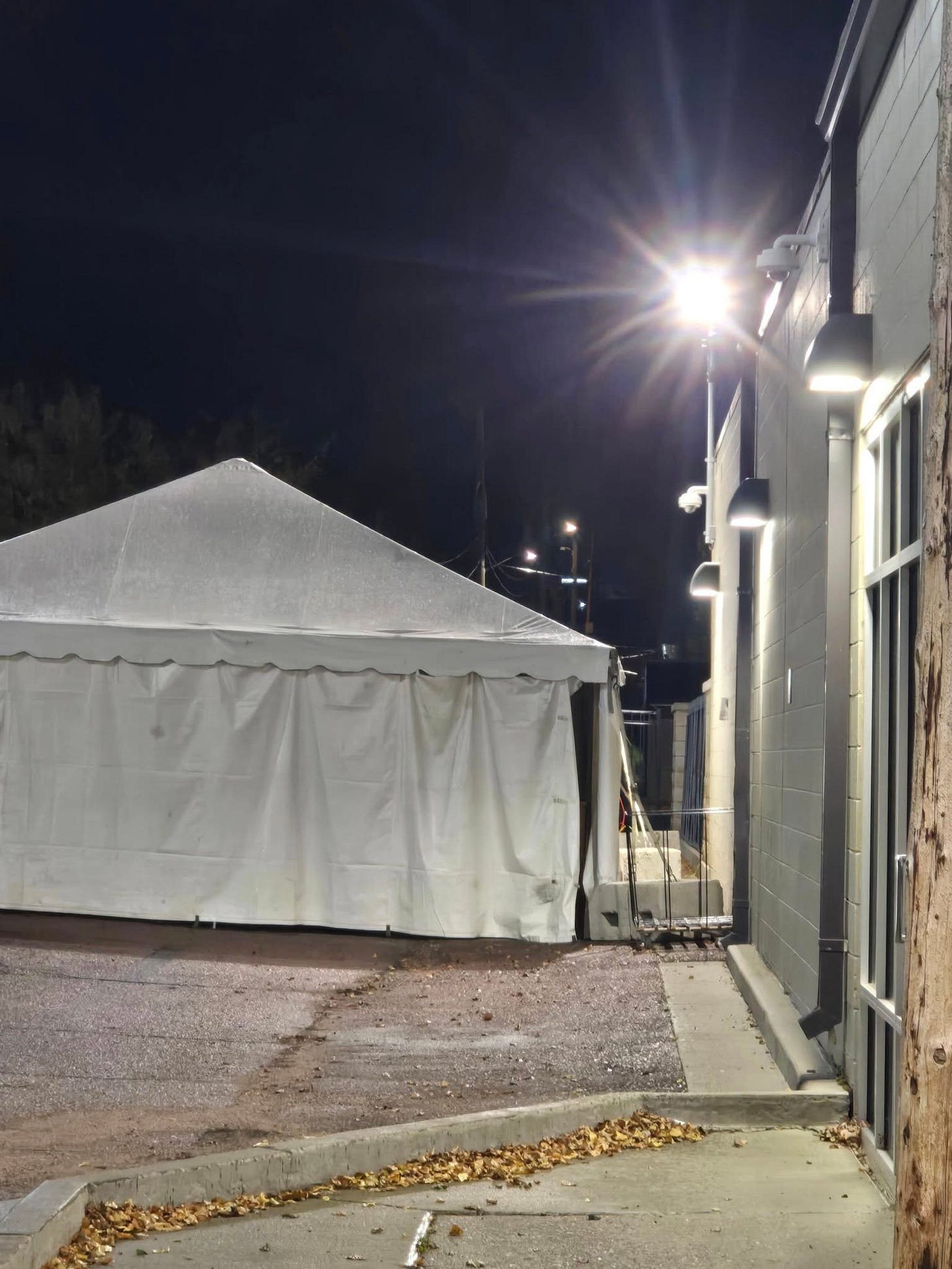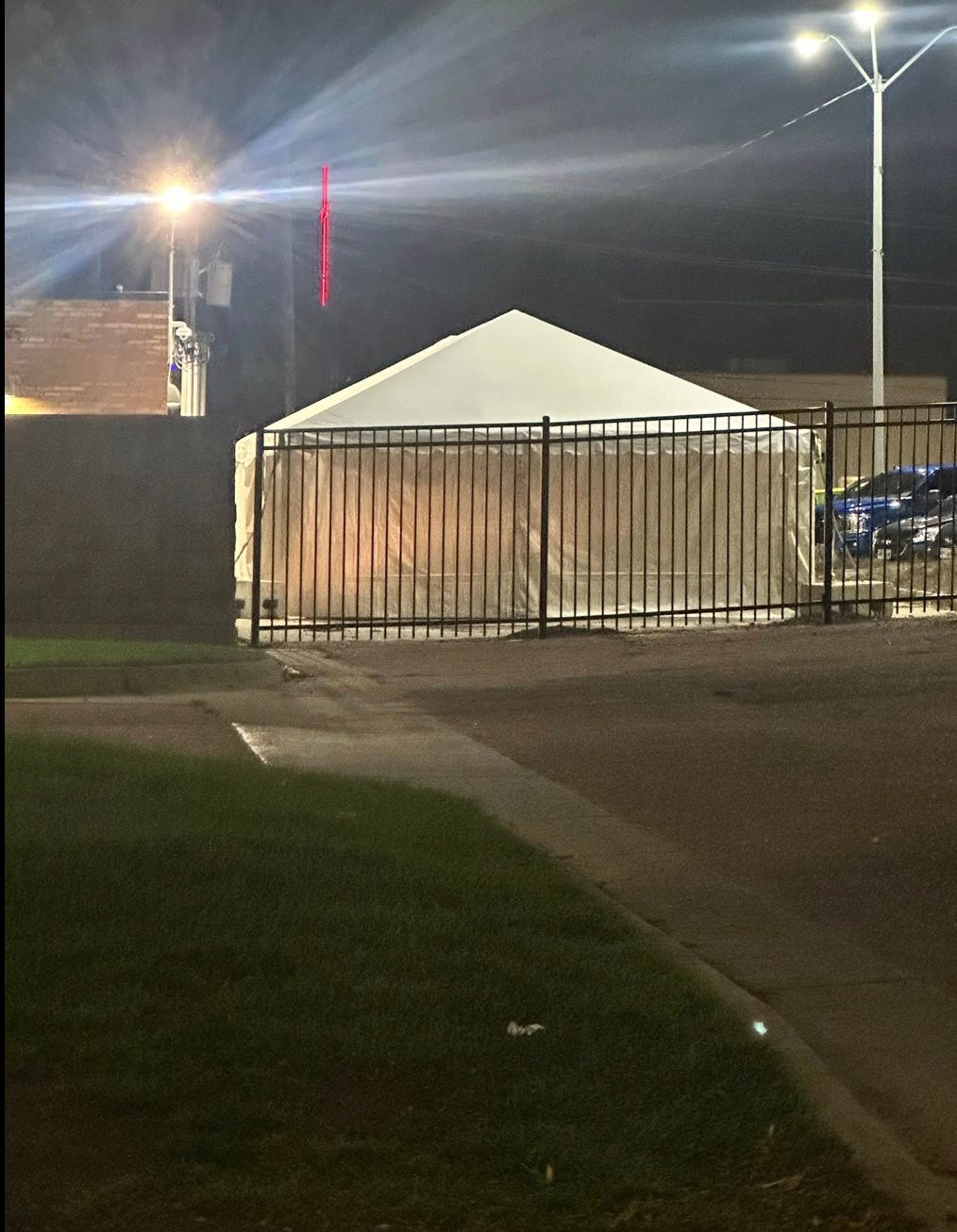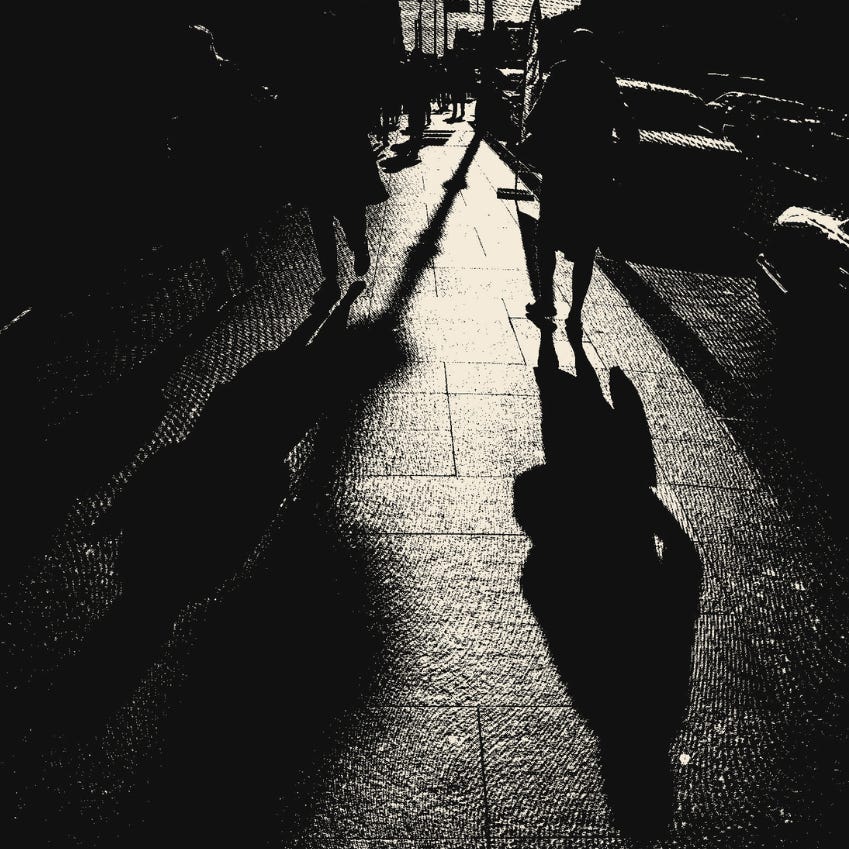"It's So Much More Than Spending a Night in a Tent."
Sioux Falls replied, "...is it?"
AS SIOUX FALLS GROWS, so does our collectivity. Our voice becomes stronger, our eyes more watchful. With growth comes more people, more perspectives, more opinions, and greater demand for services and solutions. And what about anger? Well, yes, that too. Naturally.
Anger is not always a bad thing, and we should not treat it as such. Anger rooted in purpose initiates conversation, work, and progress. Anger responds to injustice.
So, what’s all this emotive jargon about, Jackie? I’m so glad you asked!
Let’s take a dive into some recent Facebook happenings. Then, I’ll share the story of a community member that felt the need to take the situation into her own hands, using her voice beyond social media.
On Thursday, October 16th, 2025, the Bishop Dudley Hospitality House hosted their 11th Annual Night of Hope event. This event is a way for local community members to sleep outside the Bishop Dudley, “in a simulation of homelessness”, including a facility and neighborhood tour and the opportunity to hear from some of the guests. In fewer words, it’s a fundraiser. It’s a way to raise awareness. But fundamentally, “It’s so much more than spending a night in a tent.” — according to the Bishop Dudley’s Facebook post about the event.


In response to the BDHH’s Facebook post, little voices began to trickle in. In the form of (so far) 150+ Facebook comments. And the varied response was—
OK, JACKIE. JUST SHOW THE SCREENSHOTS.
Right. See here:
Some of them were more brass than others:
Some of them dripping with constructive criticism (and incredibly articulate for a FB comment, kudos for that):
Some of them posing irony or urging resistance:
And some of them unsure, but hey!— they’re asking questions…
BUT JACKIE! THEY WEREN’T ALL NEGATIVE!
You’re right. Amongst the sea of comments, there were still gentle waves of praise. Or at least mists of tender suggestions:
Voices rose in defense for the BDHH and community leaders, highlighting their acts of service and kindness.
As alluded to in that third comment here, a main defense was: “At least they’re doing something…” then, “what are you doing?”
Truly— a mixed bag.
Facebook gives people a cushier platform to speak their mind. It is easier than attending a city council meeting (which I still strongly suggest everyone does), making a phone call, or sending a letter— FB is a more convenient way to still use your voice. In some ways, it’s ‘safer’; it’s just less personal.
But it’s not just comments, now. Some have taken it beyond Facebook, because this? *Is* personal.
I SPOKE WITH REANNA, who on Oct. 20th explained in a post that due to her outcry online, she was blocked by Bishop Dudley’s Facebook account. A day later, apparently after having her first phone call with the BDHH, was unblocked, though she remarked that she hasn’t yet seen them “taking actions towards mending issues with the community”.
Reanna says this is something that hits close to home for her. Her father passed in 2023, describing him as her angel, and to others- “that ‘lost guy’ on the street corner.”
She tells me, “Now that he’s gone, I look at the places he’s been, and I’m outraged. I’m so sad. There’s someone’s dad being overlooked, and I can’t be quiet.”
Though she was young at the primary times her father struggled, she still understood some parts of his circumstances and continues to resonate on it. Now, she’s angry.
“I remember hearing as a teen he was at the Bishop Dudley. He was trying to get help and looking for resources. I also remember hearing of him being kicked out and not having anywhere to go. And I can’t help but to think…. What were the conditions like then? Were the resources really resources, or just a front? I’m enraged by the mockery they make of the community now. These people are still someone’s family. And yet others can’t see it, because either they lost sight, or the goal wasn’t truly to help.”
So, Reanna called the Bishop Dudley again. On October 22nd, her phone call was returned. When she answered, she was transferred to a voice who introduced herself as Bishop Dudley’s director, Madeline Shields.
The following is a brief transcript of parts of the ~11-minute recorded phone call.
—
Within two minutes, the call is already tense. Reanna wants to discuss the situation du jour— the community’s strong reaction to this year’s Night of Hope event— which Shields proudly affirms is on its 11th consecutive year.
“I’m not going to debate an internet post—I will not do it. I am above that. If you have really concerning ideas about the Bishop Dudley house, I am all ears.” Shields declares.
She invites Reanna to a facility tour, which is abruptly declined, “An invitation that I don’t want to accept—”
“—Okay—Okay, then I think we’re done!—Yep!—Thank you for calling—”. Shields interrupts with a ceasefire attempt. But nothing is shut down.
Reanna is able to squeak in that she is recording and will be posting the call “so that [the internet] can see that even the ministry won’t hear somebody from the community out.”
Shields intervenes, “That’s fine!—I am hearing you—I want to—I am inviting you in.”
The two voices continue to overlap.
“No, you have been interrupting me—and I said no— and because I didn’t accept your invitation, you have been stonewalling,” Reanna says.
“What—what do you want? What’s your question?” Shields snaps back, irritated.
After a deep breath in, Reanna’s speech becomes slower, more poignant, “Why have you guys not accepted, or taken acknowledgment—accountability—for offending the community? What is the issue there?”
The answer is met with another tour invitation and again that Shields is “not going to debate over Facebook”.
“Now, you’re saying it’s a debate, when you just told me to ask my question. I asked my question, now you don’t wanna answer it,” Reanna criticizes.
Again, Shields sharply asks, “What—What is the question? What is the question?”
Reanna rewords, “Why is the ministry okay with offending the community?”
A long pause.
“…I don’t know how to answer that question—not—if, if, if— if we have a lot of supporters, we have a lot of—
“—But you have a lot of people that are also offended—”
“—I am sorry, I am sorry that some people were offended,” Shields states.
…
Later in the phone call, Reanna brings up her concerns about the facility’s cleanliness. She notes the “unhygienic conditions” that she’s seen mentioned, asking “Would you guys at least clean up for the people that may be coming? Because—” She’s interrupted by what sounds like a sort of incredulous chuckle before Shields exclaims,
“We have over 100 people stay here every night. We are over capacity every night. We are doing God’s work here at the Bishop Dudley House and I’m sorry that you’re upset about it.”
—
Thank you to Reanna for sharing some of her story and the details surrounding her phone calls. A more in-depth look at her father’s life will be posted here soon.
(Reanna has recently coordinated a mobile outreach group, Meet You Where You’re At. She’s calling for volunteers to join her and her group this Friday, on Halloween, and beyond.)
SO WHY DOES IT MATTER, JACKIE? WHAT’S IT ALL MEAN?
Sioux Falls has become a living, breathing creature which only increases in strength as our population grows. We’re trudging our way through finding what’s wrong and right for our community, sometimes leaving little trails of bitter ooze.
I can’t imagine it’s been easy for the staff at Bishop Dudley, or the community leaders that attended A Night of Hope, to swallow the amount of criticism they’re receiving; though, indicated by the BDHH’s director, it’s not something they feel the need to address, at least via social media. I suspect they feel that they are receiving unwarranted condemnation in lieu of deserved praise for their mission’s success. Are their good deeds being overshadowed? We can’t be sure what’s being discussed offline, but regardless, there’s a conversation now. A long, historic oozy trail, in actuality.
It’s not been easy for the Bishop Dudley Hospitality House’s critics, either, who feel they are going at least unheard and unmet, and at most mocked. The recent event has brought up continued discussions surrounding the shelter’s rules, regulations, ethics, and, well, hospitality. The bigger discussion of addressing homelessness in Sioux Falls has only ramped up, especially with the recent encampment ordinance, the controversial parking-lot fence, and the concern of impending cold weather.
New topics include performative activism, what other cities are doing, and actions that are less thoughtful and more “a slap in the face”. Still, community members like Reanna, have channeled their ignited frustration into proactive advocacy.
Anger rooted in purpose initiates conversation, work, and progress.
Welcome to Sioux Falls.
Here’s what I’m trying to say:
The community is sharing feedback, because our neighborhoods— and all the people in them— matter. Will we/they listen? Can we/they change? I choose to believe that most people come from a genuine place; there are good people and good causes in our city. But good intentions don’t always lead to good outcomes, and when they don’t, the community often speaks up— louder, it seems, as our little creature grows. Ideally, we’re all working toward the same goal(s) in regard to housing and food insecurity, safety, etc. But that raises questions: Whose voices do we prioritize? Does anyone truly “know better” or hold more credibility? How do needs get wholly met? Whose trail of ooze do we choose to follow?
Often, conversations and ideas and criticisms are how we find our way through these things. Our city is no stranger to internal critique— leading to more enthusiastic, outspoken voices. Good, I think. It means people care.
It is so much more than spending a night in a tent. It’s the daybreak of a community that craves compassion. They’ve pitched their own tent, right in the middle of the maxim Sioux Falls declares: “TAKING CARE OF TODAY FOR A BETTER TOMORROW”. It’s not a comfortable site, but the camp has its roots. Where do we begin?
You’ve heard me say before that we need to face things, even and especially, when they’re uncomfortable. My sentiment stands.
Now that you see me, what do you think about all this? I want to hear your voice:




















Thank you for this. I saw some of it going down on Facebook, but the follow-up phone call speaks volumes, as does your analysis of it and the parties involved. Looking forward to your next posts!